- Home
- W. Somerset Maugham
Cakes and Ale Page 15
Cakes and Ale Read online
Page 15
Mrs Barton Trafford was then a woman of about fifty; she was small and slight, but with rather large features, which made her head look a little too big for her body; she had crisp, white hair which she wore like the Venus of Milo, and she was supposed in her youth to have been very comely. She dressed discreetly in black silk, and wore round her neck jangling chains of beads and shells. She was said to have been unhappily married in early life, but now for many years had been congenially united to Barton Trafford, a clerk in the Home Office and a well-known authority on prehistoric man. She gave you the curious impression of having no bones in her body, and you felt that if you pinched her shin (which, of course, my respect for her sex as well as something of quiet dignity in her appearance would have never allowed me to do) your fingers would meet. When you took her hand it was like taking a fillet of sole. Her face, notwithstanding its large features, had something fluid about it. When she sat it was as though she had no backbone and were stuffed, like an expensive cushion, with swansdown.
Everything was soft about her, her voice, her smile, her laugh; her eyes, which were small and pale, had the softness of flowers; her manner was as soft as the summer rain. It was this extraordinary and charming characteristic that made her the wonderful friend she was. It was this that had gained her the celebrity that she now enjoyed. The whole world was aware of her friendship with the great novelist whose death a few years back had come as such a shock to the English-speaking peoples. Everyone had read the innumerable letters which he had written to her and which she was induced to publish shortly after his demise. Every page revealed his admiration for her beauty and his respect for her judgement; he could never say often enough how much he owed to her encouragement, her ready sympathy, her tact, her taste; and if certain of his expressions of passion were such as some persons might think would not be read by Mr Barton Trafford with unmixed feelings, that only added to the human interest of the work. But Mr Barton Trafford was above the prejudices of vulgar men (his misfortune, if such it was, was one that the greatest personages in history have endured with philosophy) and, abandoning his studies of aurignacian flints and neolithic axe-heads, he consented to write a Life of the deceased novelist in which he showed quite definitely how great a part of the writer’s genius was due to his wife’s influence.
But Mrs Barton Trafford’s interest in literature, her passion for art, were not dead because the friend for whom she had done so much had become part, with her far from negligible assistance, of posterity. She was a great reader. Little that was noteworthy escaped her attention, and she was quick to establish personal relations with any young writer who showed promise. Her fame, especially since the Life, was now such that she was sure that no one would hesitate to accept the sympathy she was prepared to offer. It was inevitable that Mrs Barton Trafford’s genius for friendship should in due course find an outlet. When she read something that struck her, Mr Barton Trafford, himself no mean critic, wrote a warm letter of appreciation to the author and asked him to luncheon. After luncheon, having to get back to the Home Office, he left him to have a chat with Mrs Barton Trafford. Many were called. They all had something, but that was not enough. Mrs Barton Trafford had a flair, and she trusted her flair? her flair bade her wait.
She was so cautious indeed that with Jasper Gibbons she almost missed the bus. The records of the past tell us of writers who grew famous in a night, but in our more prudent day this is unheard of. The critics want to see which way the cat will jump, and the public has been sold a pup too often to take unnecessary chances. But in the case of Jasper Gibbons it is almost the exact truth that he did thus jump into celebrity. Now that he is so completely forgotten and the critics who praised him would willingly eat their words if they were not carefully guarded in the files of innumerable newspaper offices, the sensation he made with his first volume of poems is almost unbelievable. The most important papers gave to reviews of it as much space as they would have to the report of a prizefight, the most influential critics fell over one another in their eagerness to welcome him. They likened him to Milton (for the sonority of his blank verse), to Keats (for the opulence of his sensuous imagery), and to Shelley (for his airy fantasy); and, using him as a stick to beat idols of whom they were weary, they gave in his name many a resounding whack on the emaciated buttocks of Lord Tennyson and a few good husky smacks on the bald pate of Robert Browning. The public fell like the walls of Jericho. Edition after edition was sold, and you saw Jasper Gibbons’s handsome volume in the boudoirs of countesses in Mayfair, in vicarage drawing-rooms from Land’s End to John o’ Groats, and in the parlours of many an honest but cultured merchant in Glasgow, Aberdeen, and Belfast. When it became known that Queen Victoria had accepted a specially bound copy of the book from the hands of the loyal publisher, and had given him (not the poet, the publisher) a copy of Leaves from a Journal in the Highlands in exchange, the national enthusiasm knew no bounds.
And all this happened, as it were, in the twinkling of an eye. Seven cities in Greece disputed the honour of having given birth to Homer, and though Jasper Gibbons’s birthplace (Walsall) was well known, twice seven critics claimed the honour of having discovered him; eminent judges of literature who, for twenty years, had written eulogies of one another’s works in the weekly papers quarrelled so bitterly over this matter that one cut the other dead in the Athenaeum. Nor was the great world remiss in giving him its recognition. Jasper Gibbons was asked to luncheon and invited to tea by dowager duchesses, the wives of cabinet ministers, and the widows of bishops. It is said that Harrison Ainsworth was the first English man of letters to move in English society on terms of equality (and I have sometimes wondered that an enterprising publisher on this account has not thought of bringing out a complete edition of his works); but I believe that Jasper Gibbons was the first poet to have his name engraved at the bottom of an At Home card as a draw as enticing as an opera singer or a ventriloquist.
It was out of the question then for Mrs Barton Trafford to get in on the ground floor. She could only buy in the open market. I do not know what prodigious strategy she employed, what miracles of tact, what tenderness, what exquisite sympathy, what demure blandishments; I can only surmise and admire; she nobbled Jasper Gibbons. In a little while he was eating out of her soft hand. She was admirable. She had him to lunch to meet the right people; she gave At Homes where he recited his poems before the most distinguished persons in England; she introduced him to eminent actors who gave him commissions to write plays; she saw that his poems should only appear in the proper places; she dealt with the publishers and made contracts for him that would have staggered even a Cabinet minister; she took care that he should accept only the invitations of which she approved; she even went so far as to separate him from his wife, with whom he had lived happily for ten years, since she felt that a poet to be true to himself and his art must not be encumbered with domestic ties. When the crash came Mrs Barton Trafford, had she chosen, might have said that she had done everything for him that it was humanly possible to do.
For there was a crash. Jasper Gibbons brought out another volume of poetry; it was neither better nor worse than the first; it was very much like the first; it was treated with respect, but the critics made reservations; some of them even carped. The book was a disappointment. Its sale also. And unfortunately Jasper Gibbons was inclined to tipple. He had never been accustomed to having money to spend, he was quite unused to the lavish entertainments that were offered him, perhaps he missed his homely, common little wife; once or twice he came to dinner at Mrs Barton Trafford’s in a condition that anyone less unworldly, less simple-minded than she, would have described as blind to the world. She told her guests gently that the bard was not quite himself that evening. His third book was a failure. The critics tore him limb from limb, they knocked him down and stamped on him, and, to quote one of Edward Driffield’s favourite songs, then they lugged him round the room and then they jumped upon his face; they were quite naturally annoyed that they had mist
aken a fluent versifier for a deathless poet, and were determined that he should suffer for their error. Then Jasper Gibbons was arrested for being drunk and disorderly in Piccadilly and Mr Barton Trafford had to go to Vine Street at midnight to bail him out.
Mrs Barton Trafford at this juncture was perfect. She did not repine. No harsh word escaped her lips. She might have been excused if she had felt a certain bitterness because this man for whom she had done so much had let her down. She remained tender, gentle, and sympathetic. She was the woman who understood. She dropped him, but not like a hot brick, or a hot potato. She dropped him with infinite gentleness, as softly as the tear that she doubtless shed when she made up her mind to do something so repugnant to her nature; she dropped him with so much tact, with such sensibility, that Jasper Gibbons perhaps hardly knew he was dropped. But there was no doubt about it. She would say nothing against him, indeed she would not discuss him at all, and when mention was made of him she merely smiled, a little sadly, and sighed. But her smile was the coup de grace, and her sigh buried him deep.
Mrs Barton Trafford had a passion for literature too sincere to allow a setback of this character long to discourage her; and however great her disappointment she was a woman of too disinterested a nature to let the gifts of tact, sympathy, and understanding with which she was blessed by nature lie fallow. She continued to move in literary circles, going to tea parties here and there, to soirees, and to At Homes, charming always and gentle, listening intelligently, but watchful, critical, and determined (if I may put it crudely) next time to back a winner. It was then that she met Edward Driffield, and formed a favourable opinion of his gifts. It is true that he was not young, but then he was unlikely like Jasper Gibbons to go to pieces. She offered him her friendship. He could not fail to be moved when, in that gentle way of hers, she told him that it was a scandal that his exquisite work remained known only in the narrow circle. He was pleased and flattered. It is always pleasant to be assured that you are a genius. She told him that Barton Trafford was reflecting on the possibility of writing an important article on him for the Quarterly Review. She asked him to luncheon to meet people who might be useful to him. She wanted him to know his intellectual equals. Sometimes she took him for a walk on the Chelsea Embankment, and they talked of poets dead and gone, and love and friendship, and had tea in an ABC shop. When Mrs Barton Trafford came to Limpus Street on Saturday afternoon she had the air of the queen bee preparing herself for the nuptial flight.
Her manner with Mrs Driffield was perfect. It was affable, but not condescending. She always thanked her very prettily for having allowed her to come and see her and complimented her on her appearance. If she praised Edward Driffield to her, telling her with a little envy in her tone what a privilege it was to enjoy the companionship of such a great man, it was certainly from pure kindness, and not because she knew that there is nothing that exasperates the wife of a literary man more than to have another woman tell her flattering things about him. She talked to Mrs Driffield of the simple things her simple nature might be supposed to be interested in, of cooking and servants and Edward’s health, and how careful she must be with him. Mrs Barton Trafford treated her exactly as you would expect a woman of very good Scotch family, which she was, to treat an ex-barmaid with whom a distinguished man of letters had made an unfortunate marriage. She was cordial, playful, and gently determined to put her at her ease.
It was strange that Rosie could not bear her; indeed, Mrs Barton Trafford was the only person that I ever knew her dislike. In those days even barmaids did not habitually use the ‘bitches’ and ‘bloodys’ that are part and parcel of the current vocabulary of the best-brought-up young ladies and I never heard Rosie use a word that would have shocked my Aunt Sophie. When anyone told a story that was a little near the knuckle she would blush to the roots of her hair. But she referred to Mrs Barton Trafford as ‘that damned old cat’. It needed the most urgent persuasions of her more intimate friends to induce her to be civil to her.
‘Don’t be a fool, Rosie,’ they said. They all called her Rosie, and presently I, though very shyly, got in the habit of doing so too. ‘If she wants to she can make him. He must play up to her. She can work the trick if anyone can.’
Though most of the Driffields’ visitors were occasional, appearing every other Saturday, say, or every third, there was a little band that, like myself, came almost every week. We were the stand-bys; we arrived early and stayed late. Of these the most faithful were Quentin Forde, Harry Retford, and Lionel Hillier.
Quentin Forde was a stocky little man with a fine head of the type that was afterward for a time much admired in the moving pictures, a straight nose and handsome eyes, neatly cropped grey hair and a black moustache; if he had been four or five inches taller he would have been the perfect type of the villain of melodrama. He was known to be very ‘well connected’, and he was affluent; his only occupation was to cultivate the arts. He went to all the first nights and all the private views. He had the amateur’s severity, and cherished for the productions of his contemporaries a polite but sweeping contempt. I discovered that he did not come to the Driffields’ because Edward was a genius, but because Rosie was beautiful.
Now that I look back I cannot get over my surprise that I should have had to be told what was surely so obvious. When I first knew her it never occurred to me to ask myself whether she was pretty or plain, and when, seeing her again after five years, I noticed for the first time that she was very pretty, I was interested but did not trouble to think much about it. I took it as part of the natural order of things, just as I took the sun setting over the North Sea or the towers of Tercanbury Cathedral. I was quite startled when I heard people speak of Rosie’s beauty, and when they complimented Edward on her looks and his eyes rested on her for a moment, mine followed his. Lionel Hillier was a painter, and he asked her to sit for him. When he talked of the picture he wanted to paint and told me what he saw in her, I listened to him stupidly. I was puzzled and confused. Harry Retford knew one of the fashionable photographers of the period and, arranging special terms, he took Rosie to be photographed. A Saturday or two later the proofs were there, and we all looked at them. I had never seen Rosie in evening dress. She was wearing a dress in white satin, with a low train and puffy sleeves, and it was cut low; her hair was more elaborately done than usual. She looked very different from the strapping young woman I had first met in Joy Lane in a boater and a starched shirt. But Lionel Hillier tossed the photographs aside impatiently.
‘Rotten,’ he said. ‘What can a photographer give of Rosie? The thing about her is her colour.’ He turned to her. ‘Rosie, don’t you know that your colour is the great miracle of the age?’
She looked at him without answering, but her full red lips broke into their childlike, mischievous smile.
‘If I can only get a suggestion of it I’m made for life,’ he said. ‘All the rich stockbrokers’ wives will come on their bended knees and beg me to paint them like you.’
Presently I learned that Rosie was sitting for him, but when, never having been in a painter’s studio and looking upon it as the gateway of romance, I asked if I might not come one day and see how the picture was getting on, Hillier said that he did not want anyone to see it yet. He was a man of five and thirty and of a flamboyant appearance. He looked like a portrait of Van Dyck in which the distinction had been replaced by good humour. He was slightly above the middle height, slim; and he had a fine mane of black hair and flowing moustaches and a pointed beard. He favoured broad-brimmed sombreros and Spanish capes. He had lived a long time in Paris, and talked admiringly of painters, Monet, Sisley, Renoir, of whom we had never heard, and with contempt of Sir Frederick Leighton and Mr Alma-Tadema and Mr G. F. Watts, whom in our heart of hearts we very much admired. I have often wondered what became of him. He spent a few years in London trying to make his way, failed, I suppose, and then drifted to Florence. I was told that he had a drawing school there, but when, years later, chancing to be in that c
ity, I asked about him, I could find no one who had ever heard of him. I think he must have had some talent, for I have even now a very vivid recollection of the portrait he painted of Rosie Driffield. I wonder what has happened to it. Has it been destroyed, or is it hidden away, its face to the wall, in the attic of a junk shop in Chelsea? I should like to think that it has at least found a place on the walls of some provincial gallery.
When I was at last allowed to come and see it, I put my foot in it fine and proper. Hillier’s studio was in the Fulham Road, one of a group at the back of a row of shops, and you went in through a dark and smelly passage. It was a Sunday afternoon in March, a fine blue day, and I walked from Vincent Square through deserted streets. Hillier lived in his studio; there was a large divan on which he slept, and a tiny little room at the back where he cooked his breakfast, washed his brushes and, I suppose, himself.
When I arrived Rosie still wore the dress in which she had been sitting, and they were having a cup of tea. Hillier opened the door for me, and, still holding my hand, led me up to the large canvas.

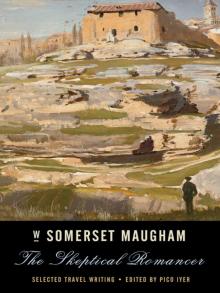 The Skeptical Romancer: Selected Travel Writing
The Skeptical Romancer: Selected Travel Writing The Summing Up
The Summing Up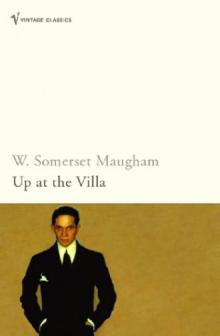 Up at the Villa
Up at the Villa The Razor's Edge
The Razor's Edge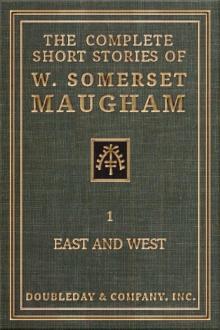 The Complete Short Stories of W. Somerset Maugham: East and West (Vol. 1 of 2))
The Complete Short Stories of W. Somerset Maugham: East and West (Vol. 1 of 2))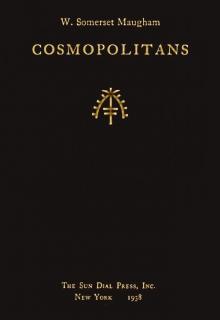 Cosmopolitans
Cosmopolitans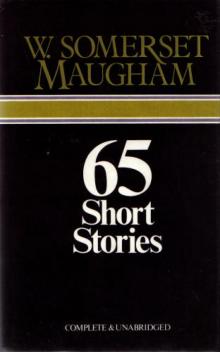 65 Short Stories
65 Short Stories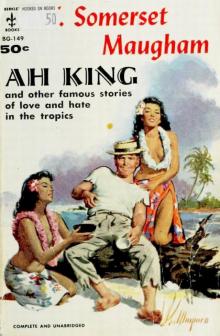 Ah King (Works of W. Somerset Maugham)
Ah King (Works of W. Somerset Maugham) Collected Short Stories: Volume 1
Collected Short Stories: Volume 1 Collected Short Stories Volume 2
Collected Short Stories Volume 2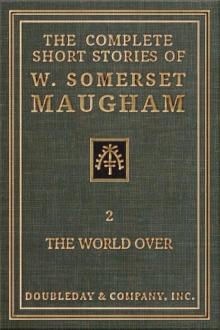 The Complete Short Stories of W. Somerset Maugham - II - The World Over
The Complete Short Stories of W. Somerset Maugham - II - The World Over Collected Short Stories Volume 4
Collected Short Stories Volume 4 Theatre
Theatre Short Stories
Short Stories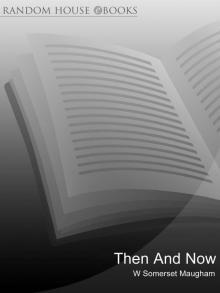 Then and Now
Then and Now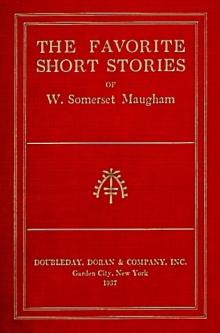 The Favorite Short Stories of W. Somerset Maugham
The Favorite Short Stories of W. Somerset Maugham Of Human Bondage
Of Human Bondage The Magician
The Magician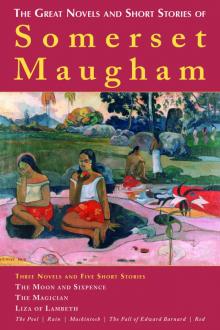 The Great Exotic Novels and Short Stories of Somerset Maugham
The Great Exotic Novels and Short Stories of Somerset Maugham A Writer's Notebook
A Writer's Notebook Christmas Holiday
Christmas Holiday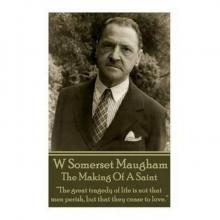 The Making of a Saint
The Making of a Saint Merry Go Round
Merry Go Round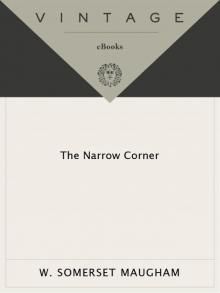 The Narrow Corner
The Narrow Corner Collected Short Stories Volume 3
Collected Short Stories Volume 3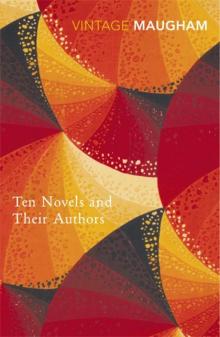 Ten Novels and Their Authors
Ten Novels and Their Authors Ashenden
Ashenden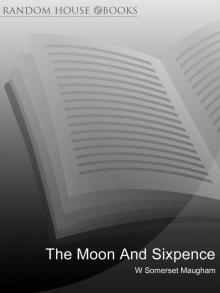 The Moon and Sixpence
The Moon and Sixpence Cakes and Ale
Cakes and Ale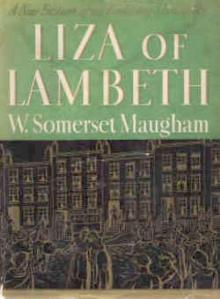 Liza of Lambeth
Liza of Lambeth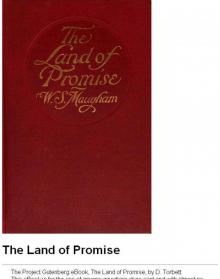 The Land of Promise: A Comedy in Four Acts (1922)
The Land of Promise: A Comedy in Four Acts (1922) A Writer's Notebook (Vintage International)
A Writer's Notebook (Vintage International)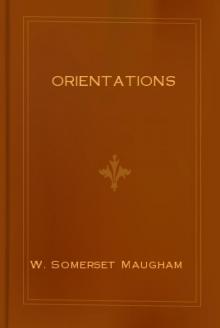 Orientations
Orientations Selected Masterpieces
Selected Masterpieces Mrs Craddock
Mrs Craddock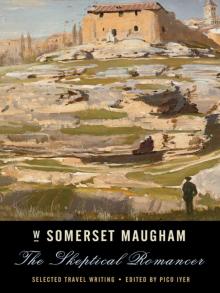 The Skeptical Romancer
The Skeptical Romancer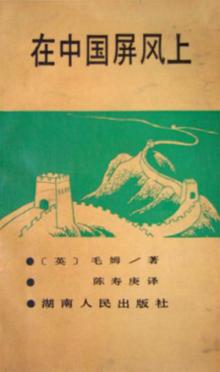 On a Chinese Screen
On a Chinese Screen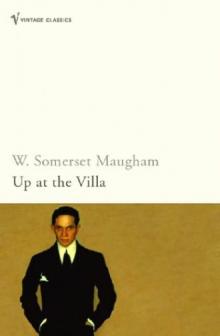 (1941) Up at the Villa
(1941) Up at the Villa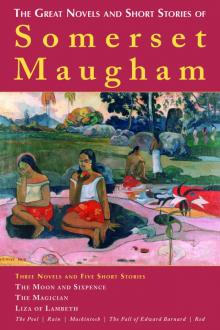 The Great Novels and Short Stories of Somerset Maugham
The Great Novels and Short Stories of Somerset Maugham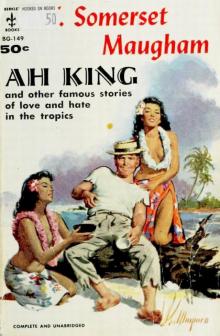 Ah King
Ah King The Explorer
The Explorer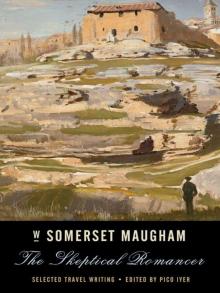 The Skeptical Romancer: Selected Travel Writing (Vintage Departures)
The Skeptical Romancer: Selected Travel Writing (Vintage Departures)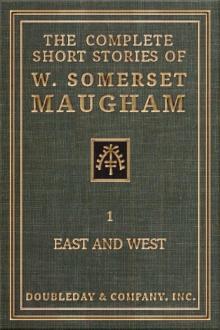 The Complete Short Stories of W. Somerset Maugham - I - East and West
The Complete Short Stories of W. Somerset Maugham - I - East and West